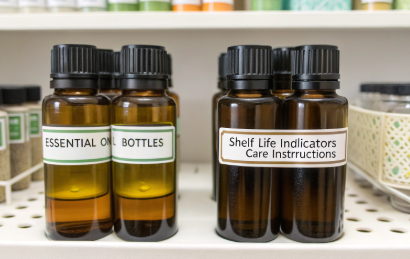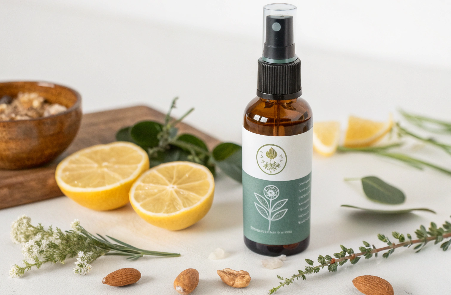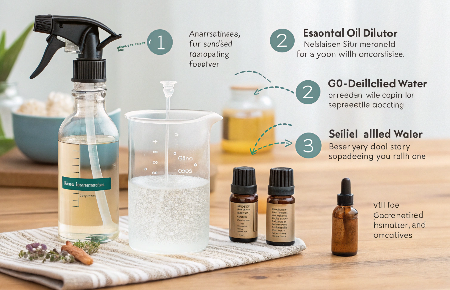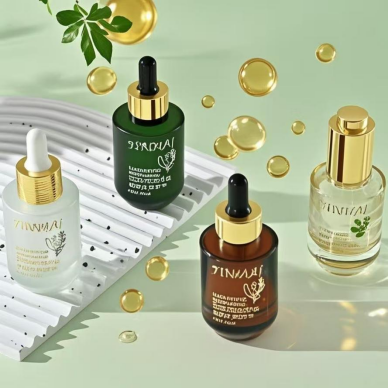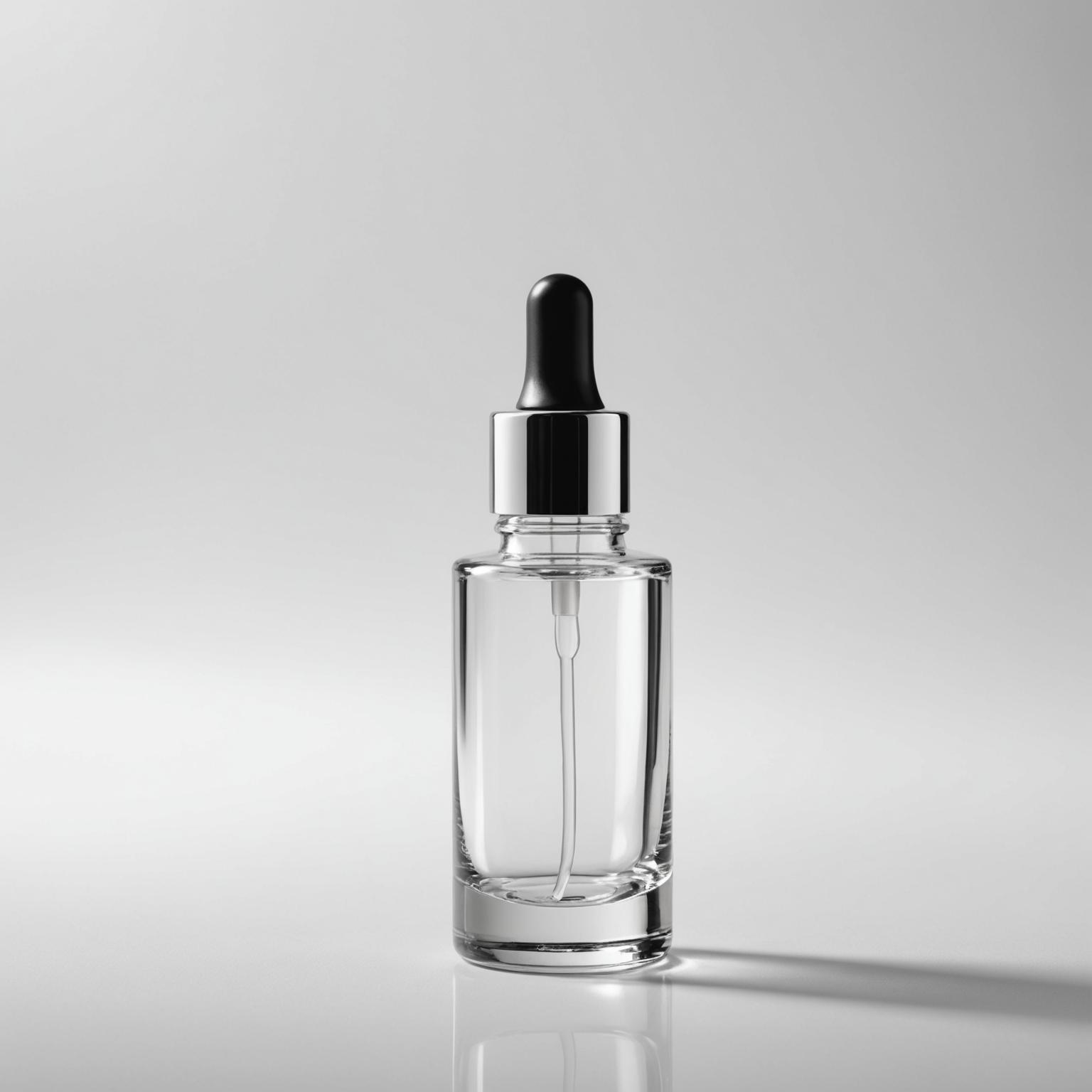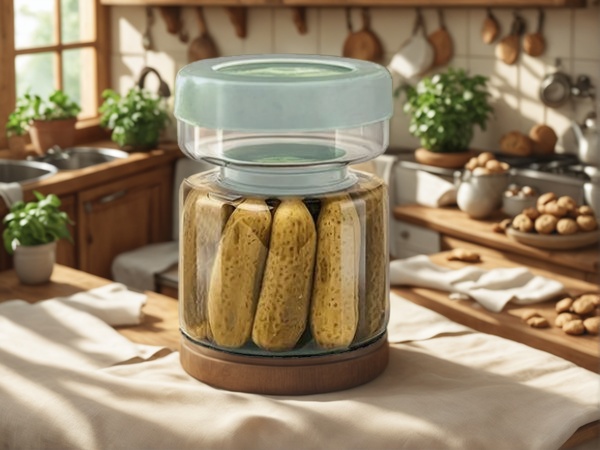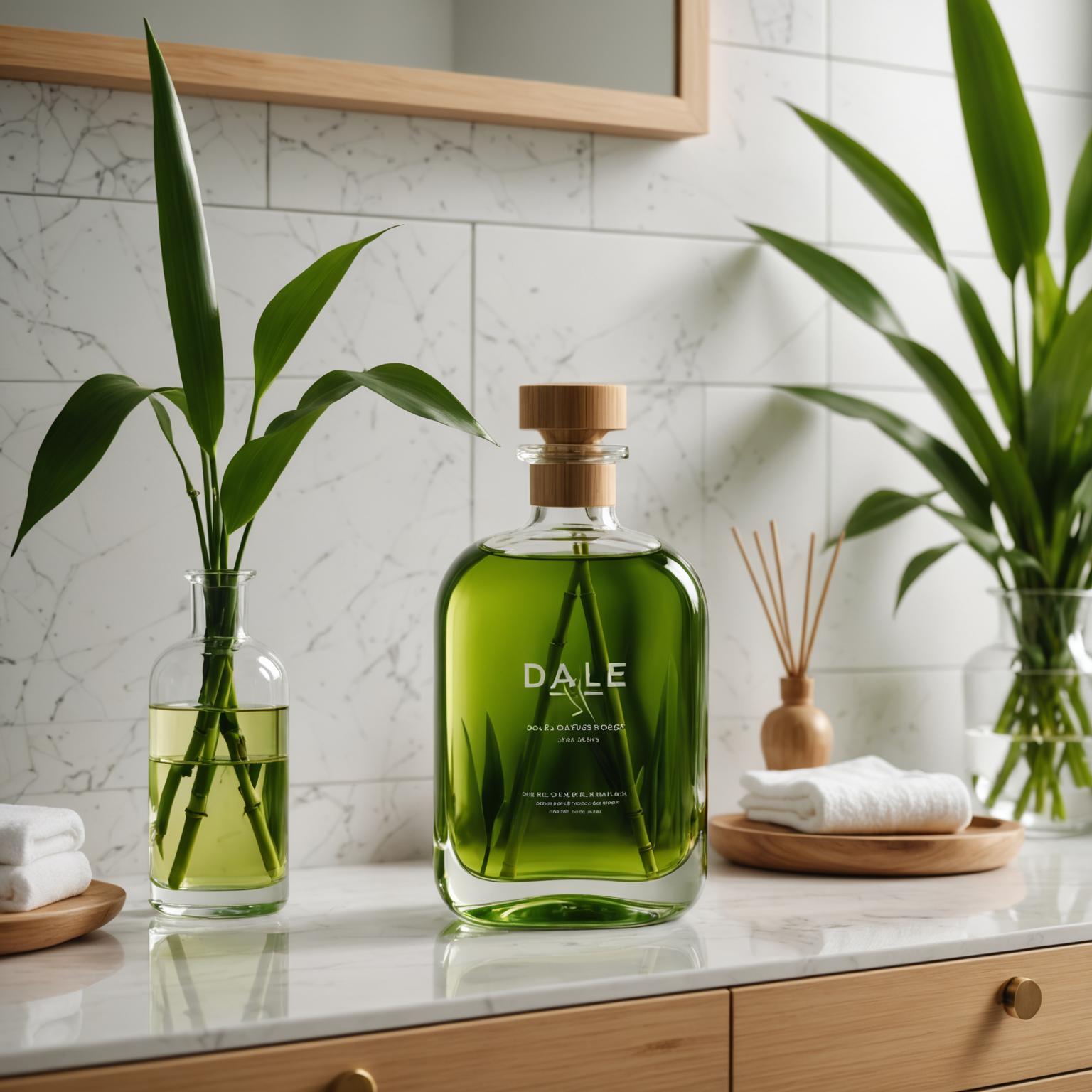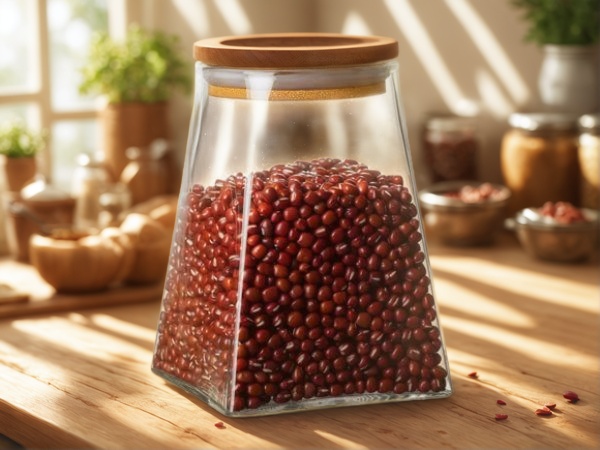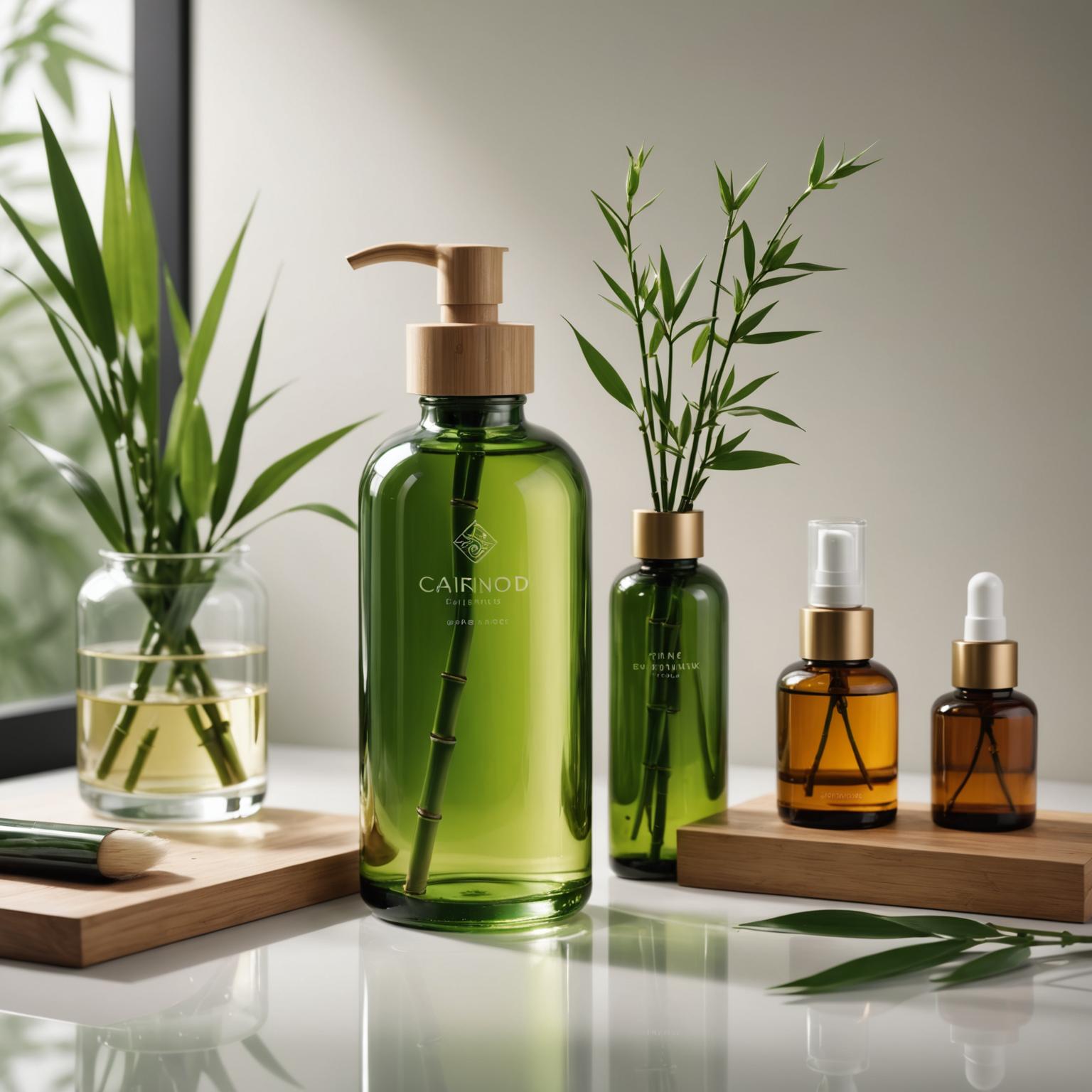Want to enjoy essential oils without overwhelming scent or skin irritation? Then dilution is your best friend—especially when using oils in sprays, skincare, or room mists.
To dilute essential oils with water, combine them with a solubilizer like alcohol or witch hazel to help disperse the oil evenly, and stick to a safe ratio of 1–2% essential oil per 100ml of water.
Let’s explore how to dilute correctly, avoid common mistakes, and make your oils safer and more effective—whether you're creating body sprays, room fresheners, or DIY blends.
Can I dilute essential oil with water as spray?
Yes—but water alone isn't enough.
You can dilute essential oils with water to make a spray, but you need to add a solubilizer such as witch hazel or ethanol to help the oils mix and stay dispersed.
Essential oils and water naturally separate. Without help, the oils float on top, leading to:
-
Uneven scent or function
-
Risk of skin irritation (from direct oil contact)
-
Clogged spray nozzles
What are the benefits of mixing essential oils with water for room sprays, cleaning solutions, or diffusers?
Blending essential oils with water opens up a world of natural and versatile uses around your home—minus the overpowering scents or harsh chemicals found in many commercial products.
Here’s how diluting essential oils with water can upgrade your routine:
- Natural Room Sprays:Mix oils like lemon, eucalyptus, or lavender with water for a quick and easy way to freshen up rooms. Not only do you create a pleasant, uplifting atmosphere, but you also skip synthetic fragrances.
- Safe Cleaning Solutions:Tea tree, citrus, and peppermint oils can be added to water to make gentle yet effective sprays for wiping down surfaces. These DIY cleaners help reduce chemical residue while leaving a clean scent behind.
- Aromatherapy in Diffusers:Adding a few drops of essential oil to your diffuser’s water tank lets you enjoy continuous aromatherapy. This can help support relaxation, focus, or even clear the air, depending on the oils you choose.
By making your own blends, you can tailor scents to your preferences, minimize exposure to unnecessary additives, and add a touch of well-being to daily routines—all while keeping application simple and effective.
When do you need a carrier oil instead?
Water may work for sprays, but when it comes to anything touching your skin, carrier oils are a must.
Use a carrier oil—such as fractionated coconut oil, sweet almond oil, or jojoba oil—if you're applying essential oils to your skin.Carrier oils safely dilute the intensity of essential oils, reducing the risk of irritation and making them safe for topical use. Unlike water, carrier oils can blend with essential oils, ensuring even distribution and better absorption.
For general skin applications, stick to a basic guideline:
- 1 drop of essential oil for every 5–10 drops of carrier oil
Carrier oils don't just help with safety—they can enhance the feel and effectiveness of your DIY skincare, massage blends, or personal roll-ons. Remember, water and oil don’t mix on your skin, so always reach for a quality carrier when crafting anything meant for direct contact.
Safe DIY Spray Formula (100ml)
-
Distilled Water: 60–70ml
-
Witch Hazel or Vodka: 20–30ml
-
Essential Oils: 10–15 drops
-
Shake well before each use
At PauPack, our amber and PET spray bottles are designed to handle both alcohol-based and water-based blends—ensuring a fine, even mist without clogging or leakage.
Storing Your Essential Oil Sprays
Once you've mixed up your spray, proper storage is key to maintaining its freshness and potency. Always keep your mixture in a cool, dark spot—think bathroom cabinets or a shaded shelf, away from direct sunlight and heat.
For best results, opt for glass spray bottles (amber or cobalt blue work wonders), since essential oils can degrade plastic over time. This simple step helps preserve both the integrity of your blend and the longevity of the bottle itself.
What is the best way to dilute essential oils?
Blending isn’t just about ratio—it’s about chemistry.
The best way to dilute essential oils is to first combine them with a solubilizer like alcohol or witch hazel, then mix that solution into your water base.
Step-by-Step:
-
Measure your oils: 10–15 drops per 100ml base.
-
Blend with solubilizer: Stir into 1–2 tablespoons of vodka or witch hazel.
-
Add water: Use distilled or filtered water for purity.
-
Shake or mix thoroughly.
This method ensures even dispersion and helps preserve your blend. We often helpPauPack clientsdevelop stable, scalable versions of these formulas for private label or wholesale aromatherapy lines.
What is the ratio of essential oils to water?
Getting the ratio right is key to safety and performance.
The ideal dilution ratio is 0.5–2% essential oil to water-based solution. That’s roughly 5–20 drops of essential oil per 100ml of liquid, depending on intended use.
Recommended Ratios by Use:
| Application | Ratio | Drops per 100ml |
|---|---|---|
| Room Spray | 1–2% | 15–20 drops |
| Body Spray | 0.5–1% | 5–10 drops |
| Facial Mist | 0.25–0.5% | 3–5 drops |
| Linen Spray | 0.5–1% | 5–10 drops |
Tip:Always patch test when using sprays on skin, and shake well before each use to re-emulsify the mixture.
Which Essential Oils Pair Well with Water—and How Can You Use Them?
Choosing the right essential oil depends on both your goal and your personal scent preferences—but some classics stand out for their versatility and popularity.
Common essential oils to mix with water include:
- Lavender:Known for its soothing aroma, perfect for calming room or linen sprays.
- Lemon:A favorite for both room refreshers and natural cleaning solutions—a citrusy boost with antimicrobial properties.
- Peppermint:Invigorating and fresh, ideal for body mists and revitalizing diffusers.
- Tea Tree:Celebrated for its purifying action, often used in DIY sprays for cleaning or freshening.
- Eucalyptus:Crisp and clearing, frequently used in sprays for its clean, spa-like effect.
Typical Uses by Oil
- Room Sprays & Linen Mists:Lemon, lavender, eucalyptus
- Body Sprays & Facial Mists:Lavender, peppermint (always opt for gentle oils and patch test)
- Natural Cleaning Sprays:Lemon, tea tree, eucalyptus
- Humidifiers & Diffusers:Peppermint, lavender, eucalyptus (following device guidelines)
Depending on what you’re making, select an oil that complements your intended effect—whether that’s relaxation, cleansing, or a refreshing lift. Always remember that pure essential oils are potent, so stick to recommended ratios and guidelines for safe, effective blends.
Natural Surface Cleaning with Essential Oil Sprays
Essential oil and water mixtures make fantastic natural cleaners for your home. When combined with water, oils like tea tree or lemon offer a gentle yet effective way to tackle everyday messes—no harsh chemicals required.
How to use:
- Mix your preferred ratio of essential oil blend and water in a spray bottle.
- Use this solution to wipe countertops, clean glass, and freshen fabric surfaces.
- Tea tree oil provides antimicrobial benefits, while lemon oil helps cut through grease and leaves a pleasant scent.
This approach is not only eco-friendly, but also brings the uplifting aroma of essential oils into your cleaning routine. Always spot test on sensitive surfaces, and give the bottle a good shake before each spritz to ensure the oils are evenly dispersed.
What happens if you don't dilute essential oils?
More isn’t always better—in fact, it can be harmful.
If you don’t dilute essential oils, you risk skin burns, allergic reactions, overexposure to volatile compounds, and damage to spray mechanisms.
Common Issues with Undiluted Oils:
-
Skin Sensitivity: Redness, itching, or rash
-
Respiratory Irritation: Especially with strong oils like eucalyptus or peppermint
-
Product Instability: Oils float on water, reducing effectiveness
-
Sprayer Clogging: Thicker oil droplets can jam standard nozzles
That’s why PauPack designs spray bottleswith fine-mist, oil-compatible sprayers and leak-resistant seals—ideal for properly diluted essential oil products that look good and perform even better.
How to Use Essential Oils in Humidifiers and Diffusers
When adding essential oils to humidifiers or diffusers, a gentle approach works best.
Start by carefully reading your device's manual—different models from brands like Vitruvi or URPOWER can have unique requirements, especially regarding oil-to-water ratios and suitable oil types.Many ultrasonic diffusers are designed for a few drops of oil diluted with water, while some humidifiers might not tolerate oils at all and could sustain damage.
A few practical pointers:
- Stick to 3-5 drops per 100ml of water:More is rarely better and can overwhelm both your senses and the device’s components.
- Avoid oil blends with carrier oils or particulates:These can clog mechanisms or leave residue.
- Clean your device regularly:Oils can build up over time, so a quick rinse with mild soap helps extend lifespan and ensures consistent mist every time.
- Never add pure essential oil directly to water tanks unless the manual explicitly allows it.
Following these simple steps lets you enjoy the aromatic benefits of essential oils—while keeping your devices happy and your air fresh.
Conclusion
Diluting essential oils with water—done the right way—makes your blends safer, more stable, and more effective. With the right ratio and a proper solubilizer, your essential oil spray becomes both functional and fragrant.




